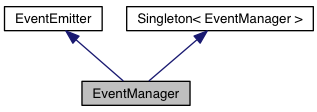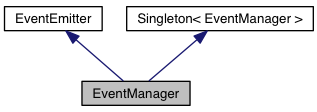|
| virtual void | clear (bool doRelease=true) |
| | remove all handlers and also removes unprocessed enqueued events
|
| |
| virtual void | blockEvent (long inEventType) |
| | temporarily ignore all events of a particular type, just drop them on the floor
|
| |
| virtual void | unblockEvent (long inEventType) |
| | stop ignoring events of a particular type, no recovery of previously ignored events
|
| |
| virtual bool | postEvent (long inEventType, void *inEventData, EventEmitter *fromEmitter=0) |
| | post an event for handling, you probably don't need to do this directly
|
| |
| virtual bool | postEventToEmitter (long inEventType, void *inEventData, EventEmitter *toEmitter) |
| | post an event for handling but give another emitter first chance at handing it
|
| |
| void | enqueueEvent (long inEventType, UserData *inEventData, EventEmitter *inEmitter) |
| | mutexed for posting events between threads, makes copy of the data
|
| |
| bool | getQueuedEvent (long &outEventType, UserData *&outEventData, EventEmitter *&outEmitter) |
| | returns false when there are no more events in the queue
|
| |
| virtual void | addHandler (IEventHandler *inHandler, long inType=all_events) |
| | add a new handler for some event type, or for all events if no type specified
|
| |
| virtual void | removeHandler (IEventHandler *inHandler, long inType=all_events) |
| | Remove a handler for some event type, or for all events if no type specified.
|
| |
| | EventEmitter () |
| | constructor for new event emitter
|
| |
| | Singleton () |
| |
| virtual | ~Singleton () |
| |
Distributes events to event handlers. The EventManager is the core of the Pixel Dust Games Framework. All inputs to your game arrive as events via the Event Manager. This includes network messages and system level notifications in addition to user inputs such as keystrokes and mouse movements.
The EventManager expects the game developer to implement IEventHandler subclasses and register them to handle various events they are interested in.
- See Also
- IEventHandler




 Public Member Functions inherited from EventEmitter
Public Member Functions inherited from EventEmitter Public Member Functions inherited from Singleton< EventManager >
Public Member Functions inherited from Singleton< EventManager > Static Public Member Functions inherited from Singleton< EventManager >
Static Public Member Functions inherited from Singleton< EventManager > 1.8.2
1.8.2